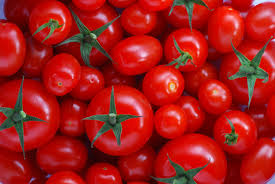I have always gotten a good kick out of the Miles Kington quote, “Knowledge is knowing that a tomato is a fruit. Wisdom is not putting it in a fruit salad.” However, while it may be wise to leave them out of a fruit salad, recent studies have suggested that it may be vital for men’s health to incorporate a few daily servings of tomatoes into their daily diet. Why? Tomatoes contain high quantities of an important chemical lycopene.
Lycopene is a carotenoid (a natural pigment made by plants). High quantities are found in fruits and vegetables like apricots, guavas and watermelons. However, the main source of lycopene in the American diet is in tomatoes and tomato-based products. It is this chemical that is thought to play a large role in reducing the risk of prostate cancer in men.
According to the American Cancer Society, about 1 man in every 7 will be diagnosed with prostate cancer during his lifetime. The disease occurs mainly in older men and approximately 6 cases in 10 are diagnosed in those people aged 65 years or more. While most men diagnosed with this form of cancer do not die from it, more then 2.5 million people in the United States are alive and fighting it today.
The World Cancer Research Fund (WCRF) and American Institute for Cancer Research (AICR) recently published recommendations for cancer prevention. However, there is inconclusive evidence to prove if these are effective in reducing the risk of developing prostate cancer.
As a result, University of Bristol, Cambridge, and Oxford researchers investigated the diets and lifestyles of men aged 50 to 69, to evaluate if there is a link between adherence to the WCRF and AICR recommendations (including lycopene intake) and prostate cancer risk. In doing so, researchers examined a large sample size: 1,806 men with the disease and 12,005 cancer-free men. The data was acquired over an eight-year period from 2001 to 2009.
Researchers concluded that men who consumed more than 10 portions of tomatoes each week – such as fresh tomatoes, tomato sauce, or tomato juice had an 18% reduction in risk for developing prostate cancer.
Although adherence to the prostate cancer-specific dietary recommendations was correlated with decreased risk of prostate cancer, this does not mean that causation is necessarily at play. These recommended nutrients alone may be insufficient for prostate cancer prevention. Also, because of the observational nature of the study, researchers are not able to “prove” causality but rather just discern a potential association.
When critiquing this study, it is important to consider potential confounding variables. Known factors such as age, black ethnicity and family history of the disease contribute greatly to a person’s risk of developing prostate cancer. Even when researchers attempt to control for these factors, chance is always a possibility.
The researchers additionally studied two other dietary components linked with prostate cancer risk – selenium, found in flour-based foods and calcium, found in dairy products. They similarly concluded that participants who maintained the recommended intake of both these dietary components had a lower risk of prostate cancer.
Ultimately, the study suggests that men should strive to incorporate 10 or more portions of tomatoes each week, between 750mg and 1,200mg of calcium a day, and between 105mcg to 200mcg of selenium daily. Because of the low cost, it may be worth adding these few daily servings of tomato-based products to your diet. However, it is also important to consider the financial opportunity cost and whether or not tomato allergies may be a relevant factor. If these aren’t a deterrent, the potential benefits could be extensive.
Nevertheless, Vanessa Er, Bristol Nutrition BRU, PhD student, who led the study asserted, “Our findings suggest that tomatoes may be important in prostate cancer prevention. However, further studies need to be conducted to confirm our findings, especially through clinical trials. Men should still eat a wide variety of fruits and vegetables, maintain a healthy weight, and stay active.“
Currently, the US Department of Agriculture and Purdue University researchers are working to develop a tomato that will contain more than twice as much lycopene and will have a longer shelf life than currently available tomatoes. The product, which is still in development, is modified with a yeast gene that slows the ripening process, allowing more time for lycopene to accumulate. It may be interesting to follow the progression of this new technology and see if could have application in other fields of food-science research.
Sources:
http://www.hsph.harvard.edu/nutritionsource/vegetables-full-story/#8
http://www.aicr.org/assets/docs/pdf/reports/Second_Expert_Report.pdf
http://www.webmd.com/vitamins-supplements/ingredientmono-900-tomato.aspx?activeingredientid=900&activeingredientname=tomato
http://cebp.aacrjournals.org/content/early/2014/07/12/1055-9965.EPI-14-0322.full.pdf+html
http://www.huffingtonpost.co.uk/2014/08/28/tomato-rich-diet-prostate-cancer-reduce-risk_n_5727780.html

